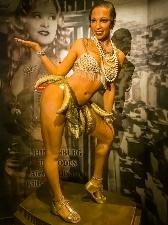
However, it was the following year, at the Folies Bergère music hall, one of the most popular of the era, that her career would reach a major turning point. In a performance called La Folie du Jour, she danced wearing little more than a skirt made of 16 bananas. The show was wildly popular with Parisian audiences and she was soon among the most popular and highest-paid performers in Europe, having the admiration of cultural figures like Pablo Picasso, Ernest Hemingway and E. E. Cummings and earning herself nicknames like “Black Venus” and “Black Pearl.” She also received more than 1,000 marriage proposals.
Capitalizing on this success, she sang professionally for the first time in 1930.
When World War II erupted later that year, she worked for the Red Cross during the occupation of France. As a member of the Free French forces, she also entertained troops in both Africa and the Middle East. Perhaps most importantly, however, Josephine did work for the French Resistance, at times smuggling messages hidden in her sheet music and even in her underwear. For these efforts, at the war’s end, Baker was awarded both the Croix de Guerre and the Legion of Honour with the rosette of the Resistance, two of France’s highest military honors.
Following the war, she spent most of her time at Les Milandes with her family. In 1950, she began to adopt babies from around the world, 12 children in all, creating what she referred to as her “rainbow tribe” and her “experiment in brotherhood.” She often invited people to the estate to see these children, to demonstrate that people of different races could in fact live together harmoniously.
In 1963, Josephine participated, alongside Martin Luther King Jr., in the March on Washington, and was among the many notable speakers that day. In honor of her efforts, the NAACP eventually named May 20th “Josephine Baker Day.”


After decades of rejection by her countrymen and a lifetime spent dealing with racism, in 1973, she performed at Carnegie Hall in New York and was greeted with a standing ovation. She was so moved by her reception that she wept openly before her audience.
The show was a huge success and marked her comeback to the stage.
In April 1975, Josephine performed at the Bobino Theater in Paris, in the first of a series of performances celebrating the 50th anniversary of her Paris debut. Numerous celebrities were in attendance, including Sophia Loren and Princess Grace of Monaco, who had been a dear friend to Baker for years.
Just days later, on April 12, 1975, she died in her sleep of a cerebral hemorrhage. She was 68.

